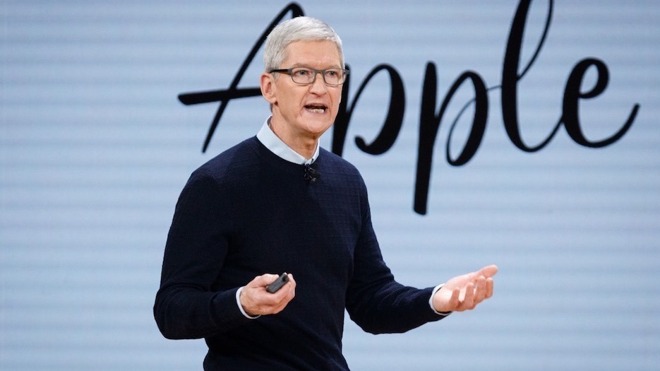Apple CEO Tim Cook donates $5M in company stock to charity
Apple CEO Tim Cook last week gifted 10,715 shares of directly owned company stock to an unidentified charity, an amount worth over $5 million at the end of trading on Friday.

Recorded by the U.S. Securities and Exchange Commission and revealed today, Cook's donation was executed on Friday. As no shares were sold, a reporting price was not applied to the transfer.
If converted on Monday, with AAPL ending the day at $503.43, Cook's gift would be worth about $5.4 million.
It is unclear where Cook's shares were transferred, though the executive has in the past donated to human rights organizations. Corporate leaders are obliged to disclose movement of owned shares, but are not required to publicly report a charitable transaction's recipient.
In 2014, Cook donated a "substantial sum" to Human Rights Campaign's Project One America, a group that promotes LGBT rights in the U.S. South. That same year, he gave $291,791 to Pennsylvania's Steel Valley School District, funds that were later used to purchase iPads for students and teachers.
Cook in 2015 and again in 2018 transferred Apple share packages to undisclosed charities, the identities of which were not revealed.
The Apple CEO is now in control of 837,374 shares of beneficially owned Apple stock, which are held in a private trust.

Recorded by the U.S. Securities and Exchange Commission and revealed today, Cook's donation was executed on Friday. As no shares were sold, a reporting price was not applied to the transfer.
If converted on Monday, with AAPL ending the day at $503.43, Cook's gift would be worth about $5.4 million.
It is unclear where Cook's shares were transferred, though the executive has in the past donated to human rights organizations. Corporate leaders are obliged to disclose movement of owned shares, but are not required to publicly report a charitable transaction's recipient.
In 2014, Cook donated a "substantial sum" to Human Rights Campaign's Project One America, a group that promotes LGBT rights in the U.S. South. That same year, he gave $291,791 to Pennsylvania's Steel Valley School District, funds that were later used to purchase iPads for students and teachers.
Cook in 2015 and again in 2018 transferred Apple share packages to undisclosed charities, the identities of which were not revealed.
The Apple CEO is now in control of 837,374 shares of beneficially owned Apple stock, which are held in a private trust.

Comments
Greedy greedy greedy
As for Tim Cook, it's his money and he can do whatever he wants with it. Good for him!
At the end of the day, he has earned the right to do what he wants with the money and whether he wants to announce to whom he has donated the money.
He has steered Apple to a $2T+ company, making many, many (Apple) shareholders happy.
This is another reason I strongly suspect the donations are being put into a Donor-Advised Fund. I'm sure you're familiar with them but for others here who are not here's how it works.
"Let’s say you’d like to contribute $10,000 in cash to charity this year, which would generally make you eligible for a $10,000 income tax deduction. But if you have $10,000 in stock that you donate instead, you’ll still be eligible to claim the same income tax deduction, plus you’ll also be eligible to eliminate any capital gains tax on the difference between the price of the stock when you bought it and when you donated it.
Sometimes, your most appreciated assets (Apple stock for example)—generally the best ones to donate because they offer the greatest potential tax benefits—are also the ones you may wish to continue to hold in your portfolio. Fortunately, nothing prevents donors from purchasing (or being vested with) new shares of stock to replace the donated shares. In the example above, you could use the $10,000 cash you were planning to donate initially to purchase the stock again.
Not only does this strategy allow you to continue to invest in a desirable asset, it can help you with long-term tax efficiency. If the stock continues to increase in value, thanks to the higher basis, you’ll owe less on your future taxes if you decide to sell it. And if the price sinks, it’s more likely that you will be able to harvest a capital loss to offset any realized capital gains."
This wasn't a press release; it was a government filing.